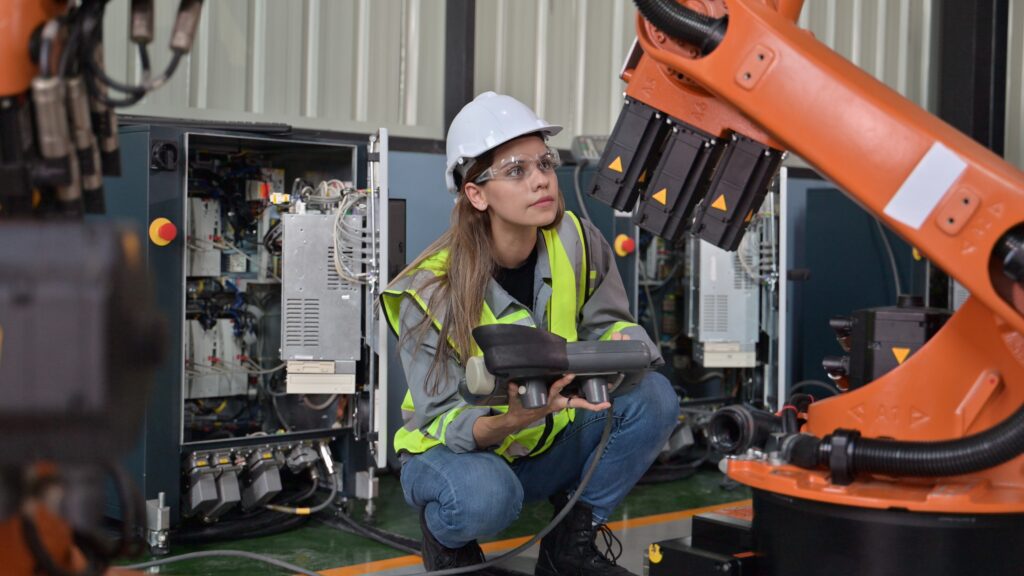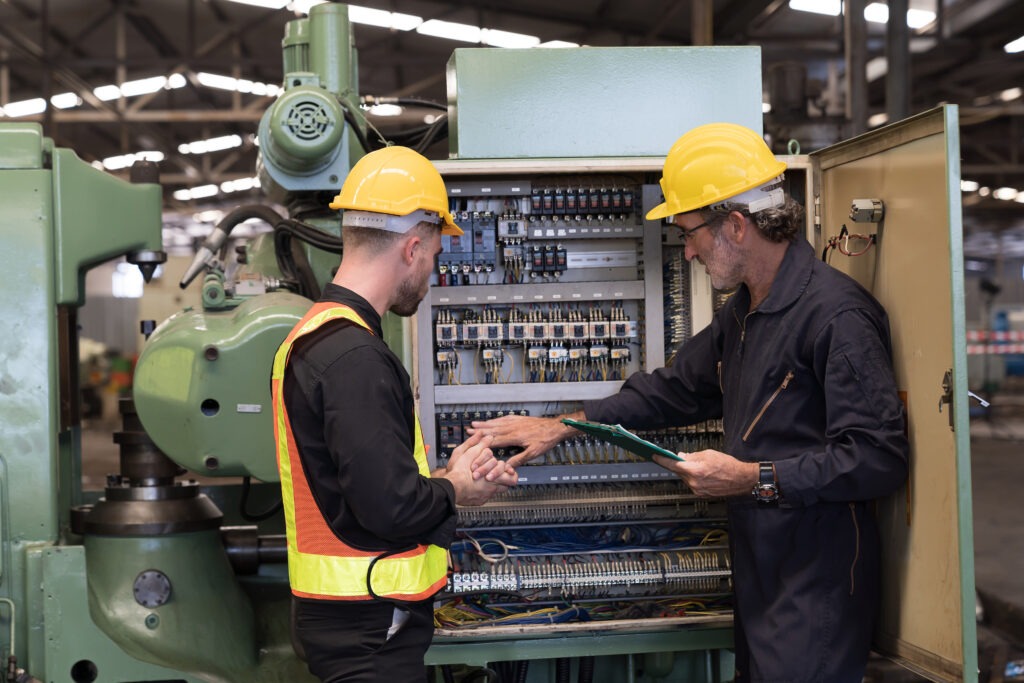Electrician - job description, training, salary
Electrician is a term that is so old that everyone should know it well enough. Yet in today's world, it's not so easy to determine where the job of an electrician begins and ends. We simply have a lot more electrical devices, electronics, AI and more around us in general. This blurs the lines in terms of old terms and, of course, old professions. So let's first take a closer look at what an electrician actually does.
Table of contents
- Electrician - job description, training, salary
- What is an electrician?
- What are the activities of an electrician?
- What qualification is required to become an electrician?
- What does the electrician training programme include?
- Which companies offer electrician training in different sectors?
- What is the income of an electrician?
- What are the requirements for the training programme?
- What electrician specialisations exist?
- How high is the demand for electricians on the job market?
- What career options follow after the apprenticeship?
Estimated reading time: 15 minutes
What is an electrician?
An electrician is a specialised expert. This means that they are characterised by the appropriate training and professional experience to work in their specialist field. This includes electrical systems and the associated equipment. They can install, maintain, check and repair.
The electrician's expertise therefore allows them to set up technical systems themselves. They can also set up communication networks and programme complex security systems.
These tasks and the knowledge required for them cannot be acquired overnight. Instead, targeted training is required. This extends over a period of three to four years. While it imparts a lot of basic knowledge, a specialisation must also be selected in order to develop in a chosen area in particular.
What does an electrician do?
Put simply, an electrician is responsible for electrical installations and systems. These are located in buildings or other structures. There, on site, the electrician installs, maintains and repairs said installations and systems. The work involved can be as simple as laying a cable. However, it can also be a little more demanding when it comes to connecting cables and electrical systems, especially lighting systems. The work culminates in the installation of complex security systems that have to perform reliably at all times and in all situations.
To ensure that all installations and systems function properly, regulations have been issued and there are industry standards. Electricians must be familiar with these and comply with them all when carrying out their work. They must also be able to check the functionality of the installations and systems and ensure that the regulations and standards are complied with. This also applies to systems that other electricians inspect, maintain and repair, even if they were installed by others.
What qualifications are needed to become an electrician ?
The profession of electrician requires a certain level of mental maturity, understanding and learning ability. In addition, specialised knowledge must be acquired that is required for the profession of electrician. To prove all this, a qualification is required.
The qualification is obtained as part of a completed vocational training programme as a tradesman electrician. This usually takes 3 to 4 years and ends with the journeyman's examination. Specific courses and further training are also required for certain specialisations.
If you already have certain school qualifications or other qualifications, the training can be shortened to 3 or even just 2.5 years. The courses to be attended combine theoretical knowledge, which is important as a basic technical understanding, with practical skills, because in the end an electrician has to work primarily in practice. This enables the trainee to meet the requirements of modern electrical engineering and fulfil the tasks of their profession.
The training is dual. This means that the theoretical parts are mainly taught at vocational school. The practical training, which takes place at the same time, takes place in a training company.
What does the electrician training programme include?
- The various fundamentals of modern electrical engineering and electronics
- Knowledge of energy supply and energy distribution
- The use of measuring and testing devices
- The installation, maintenance and repair of electrical systems
- Important basics of programming and digital technology
- Knowledge of control and regulation technology
- Occupational safety and how accidents can be avoided
- The planning of electrotechnical systems and the realisation of the planning in reality
Which companies offer electrician training in different sectors?
Various sectors are eligible for the training companies. These include
- Public sector, including transport companies and municipal utilities
- Energy supply companies
- Electrical installation companies
- Every industrial company that has its own maintenance department
- Various companies from the information and communication technology sector
How much does an electrician earn?
Let's move on to the question: How much does an electrician earn? A longer training period and the work involved naturally need to be remunerated. This is done via the salary, but this varies. It depends on a number of factors, such as the specialisation, the location of the work and the experience that the electrician brings with them.
A typical salary as an electrician immediately after successfully completing training is around 2,000 to 2,500 euros gross per month. Further training and increasing experience in the profession can raise this to 4,000 euros gross per month and more.
In larger cities, your earnings as an electrician are usually a little higher. Larger companies also usually pay a little more. After a few years of professional experience, salaries then range from 2,500 to 3,500 euros gross per month.
Specialisations and further training are also helpful when it comes to earning more money. The most important thing, however, is a master craftsman's certificate in electrical engineering. The salary of a master electrician is between 3,500 and 4,500 euros gross per month
Industrial electricians and electronics technicians with experience in energy and building technology are in particularly high demand. As a result, they often receive a salary that is slightly above the industry average.
On average, electricians in Germany earn slightly more than 39,000 € per year. For the salary of electronics technicians for building technology, this would even be slightly above 40.000 €. The average salary of an electrician generally ranges from 35,500 to 45,000 euros gross per year.
What are the requirements for electrician training?
In order to start training as an electrician, you should fulfil these requirements:
- The Educational requirements: At a minimum, a secondary school diploma or equivalent is required. However, higher qualifications are clearly preferred
- A good Technical understanding: As an electrician, you need to understand electricity and be able to calculate amperage and the like. Accordingly, a potential electrician must have an understanding of maths and physics. Only then can the technical areas of training be mastered.
- Problem-solving skills: With the increasing complexity of electrical systems, general problem-solving skills are becoming more and more important in addition to technical understanding. This is the only way for electricians in the field to master the technical challenges awaiting them in complex systems. This includes troubleshooting and fault rectification, analysing the entire system and identifying measures to close safety gaps and optimise efficiency.
- Sufficient manual dexterity: The work of an electrician is highly hands-on, so apprentices need practical abilities and good manual dexterity.
- Diligence and a sense of responsibility: Working with electricity is not without danger and the installations and systems are sometimes very complex. A trainee electrician must therefore be able to work accurately, proceed responsibly and be constantly aware of the dangers of the systems.
- Communication skills: Work as an electrician is increasingly carried out in a team. In addition, there are specialists who work with the team from outside and customers who make their own specifications. Electricians must therefore have strong communication skills in order to understand customers and tasks, coordinate their work with others and avoid misunderstandings.
- Customer orientation: Electricians must not only be able to communicate with customers. They must also understand their needs and wishes and incorporate these into the development and installation of the systems.

What electrician specialisations exist?
Choosing a career as an electrician does not mean that you are committing yourself to a specific job. Instead, there are several different areas of work to choose from in the general field of work of an electrician.
Electronics technician for energy and building technology
In the work of the electronics technicians specialising in building technology and energy technology deals with the electrical systems in buildings. If you choose this specialisation, you will plan, install and maintain all forms of electrical systems such as lighting systems, energy systems and security systems that are present in a building.
The work involves installing these systems during the construction phase of a building or during its renovation, as well as maintaining systems that have already been installed. This means you are responsible for ensuring that the energy and building technology works efficiently and is safe. This also and above all applies to the use of buildings for residential or commercial purposes.
Electronics engineer for industrial engineering
One specialisation, for example, is electronics technician for industrial engineering. If you are interested in industrial systems, how they work and how they are maintained, then this specialisation is just right for you. Here you will install machines and systems in industrial companies. You will also be responsible for their repair and general maintenance.
The tasks include monitoring production processes, diagnosing faults and maintaining operational systems. However, this also means that you need to have an understanding of industrial production and its processes. You should also be able to easily understand complex systems and optimise them for the respective operation and application.
Industrial electrician
Industrial electricians are, as the name suggests, involved with the electrics in industry. This mainly involves large-scale industry and the production and other systems that are used and operated there.
An industrial electrician for industrial engineering is primarily responsible for assisting with the installation of industrial systems. They must also be able to repair them and keep them operational.
The electrical work includes, among other things, rectifying faults in production that may occur due to faults in the systems. An industrial electrician must also service the automatic systems and maintain the control and regulation systems. In addition to the practical skills and abilities of an electrician, industrial electricians also require extensive knowledge of the various processes and systems used in industry.
Electrician for automation technology
Nowadays, automation has become indispensable. Accordingly, electricians are needed who can develop, install, maintain and repair the associated systems. This is where the electrician for automation technology comes into play.
The work also includes analysing and rectifying faults in the systems used for the automated processes. To do this, the electrician working here must also be able to understand the interface between man and machine, mechanics, electronics and IT, solve problems and analyse complex systems.

How high is the demand for electricians on the job market?
Before embarking on training or further education, it is always right to take a look at the labour market. It makes no difference how much you earn if you don't find a job at the end of your training. Then the pay is simply always the same, 0.
A look at the labour market shows that the demand for electricians is not only stable. In fact, the demand for tradespeople with this qualification is constantly increasing. There are two reasons for this.
On the one hand, the industry as a whole - especially the construction and energy sectors - is growing more and more with a focus on renewable energies. This means that more and more electricians are needed here, even under the "normal" job market conditions. In addition, increasing automation and the call for greater energy efficiency are fuelling this demand even more.
Secondly, the situation is not "normal". While the demand for electricians is growing, the number of trainees in this field is constantly decreasing. This means that while demand is constantly increasing for a consistent number of trainees, the number of trainees is decreasing. This means that the profession of electrician offers great opportunities for permanent employment with good salaries for years and decades to come.
What career options follow after the apprenticeship?
Once you have completed your training as an electrician, the question arises of what to do next? In addition to working in this profession, there are a number of careers open to you, depending on your specialisation.
The championship title
Generally speaking, however, you can pursue a traditional apprenticeship to become a master craftsman in electrical engineering. This allows you to take on projects that are much more demanding and complex. It also qualifies you to take on a management position. This also authorises you to teach trainees.
With a master craftsman title, you are also in a position to set up your own company and become self-employed if you so wish. To this end, the master electrician training programme or industrial master electrician training programme not only contains technical teaching units, but also business management components. This enables you to understand how a company works as a whole and how it can generate a profit. The requirements for a master electrician can be briefly summarised as electrician training and experience.
The state-certified technician
Another popular career path is further training to become a state-certified technician. This allows you to work in the field of electrical engineering and system electronics. This enables you to pursue certain technical specialisations and establish yourself as an expert in these fields.
State-certified technicians are often involved in responsible planning as well as in the development and implementation of major technical projects. They form the interface between technical planning in advance and practical implementation. This opens up the opportunity to take on a position in middle management.
Studying electrical engineering
The electrical engineering degree programme covers the academic area of an electrician's work. It can qualify you to work in research and development. You also have the opportunity to work in engineering - for example in industrial engineering in electrical engineering - or to take on a managerial position in industry.
Academically trained electricians are usually involved in the development of new technologies. They also work on the planning of large projects and in the field of quality management. This career path is particularly interesting for those who are enthusiastic about the more theoretical part of electrical engineering and want to see themselves at the forefront of technological developments.
Thanks to the shortage of skilled labour, you also have good opportunities if you have your own engineering office for electrical engineering. As there is a high demand for expertise in this field, you can receive numerous orders from various companies - with growing experience often combined with significantly better remuneration.
Similar topics




